Cover photo: Bianca Chang
Of all the bands that emerged from the fertile ground that was Germany in the mid-eighties, none have evolved or surprised their fans as much as Girls Under Glass. When it seemed that they had come full circle in their career, they came back last year with the amazing Backdraft, and the return of Tom Lücke to the lineup. We talked to Volker Zacharias and Axel Ermes about the band’s long career, their side projects and their future. They will perform at the Batcave live stage at W-Fest on August 24.
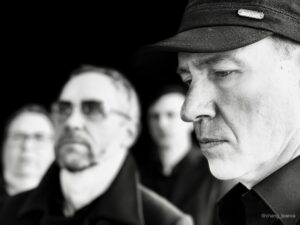
Photo: Bianca Chang
—The band was created in Hamburg in 1986 and a lot of now-famous bands were born in Germany in those days. How do you see in retrospective the goth scene of the time ?
—VZ: It was a very small scene and due to the fact that it was before internet was invented the band were promoted by a very few small fanzines. We supported Red Lorry Yellow Lorry and Fields Of The Nephilim which was the only way to get attention of new people. But it was a good way to build up a first small fan base.
—At the same time, you, Volker were the singer of Cancer Barrack, how do you remember your days with that legendary band?
—VZ: I was singer at Cancer Barrack in 88, so when Tom Lücke left GUG in 1990 I was already a bit experienced in that role. That’s why I suggested to take over the lead singer position in GUG to continue the band. At the same time, I left Cancer Barrack, but I remember it was a fantastic and very intense time with a few great concerts.
—Why did you call your first album Humus? Was it the most popular song from the first cassette/demo?
—VZ: HUMUS is like the “base” where everything else grows on, for example “Flowers”.
—Positive was the first album without Thomas Lücke, in which the band took a more electronic and industrial rock direction. Did this first change in the style was occasioned by him leaving the band?
—VZ: No, Tom decided to leave the band as he was not very much attracted by the gothic scene in general at that time. Also, he had plans to explore the world – therefore he left Germany for about a year or so.
—Your albums from the 90s, from Darius to Crystals and Stones are very diverse with influences even from trip hop. How permeable do you think that the band has been to the music popular at the moment of recording your albums?
—VZ: Good point! We were always fascinated by different kind of actual music and new trends all the time. I personally was very much into techno in the very beginning but also listened to Death Metal at the same time. So, we had many different influences and liked to combine these with the original GUG idea of being a New Wave/Goth Band.
—Firewalker was your hardest and most aggressive record. In an interview the band spoke about a weird mental state at the time. Can you please tell us more about this?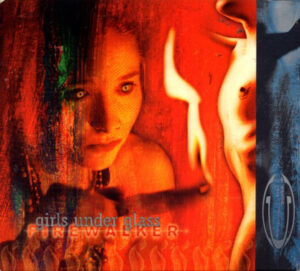
—VZ: Before we did Firewalker we decided to split up because we had no idea or vision of how to continue. Same time in this period we were fascinated by different industrial electro acts. So, we wanted to give it a last try by doing music that was heavily influenced by our private taste of music. We did not take care about the bands history or for what GUG stood for. So, with Firewalker we completely left the stage of being a New Wave/Goth band. Funny enough Firewalker became our most successful album.
—Being Spanish I have to ask you about what’s the story behind the song “Baila Con Migo”. Why in Spanish? Maybe it was a homage to Liaisons Dangereuses?
—VZ: That’s kind of an “insider”. We were invited by our friend Albert (Sturm Promotions) to play a few shows in Spain. After we returned to Hamburg “Baila Con Migo” was our way to say thank you.
—AE: Also, the (very basic) lyrics have some hints and insider jokes that probably only Albert and the guys around him at that time would understand.
—Then in Equilibrium, the band tried to find a balance between the previous metal-influenced albums and the more electronic ones. According to you, what’s the perfect equilibrium for the band between guitars and electronic? Closer to what we could call darkwave?
—VZ: Another good question! In fact, Equilibrium was THE album where GUG decided to back to the roots because we felt it was the only possible way how to continue. If we exclude the following album, Minddiver I definitely can see the red line from Equilibrium to the present time and our last album Backdraft. It was important for us to send out a statement after FIREWALKER that we still know where we come from and that we know how to write good songs even without adding modern elements. So, it was a conservative step back to the good old times and it felt so much more natural and really good!
—In Minddiver we can find a cover of “Frozen” that you are still playing live. What did you find interesting in this song? The band also covered Gary Numan in the past and many others. What do you look for when you do a cover?
—VZ: We look for something that you do not find in the original. We want to use the original song idea and make it a GUG song. After doing many different cover versions I think we are good at that. And it’s an interesting and different part of our musical expression. Especially “Frozen” being a pop song was a really nice challenge, because we wanted to add the GUG typical goth-electro flavor. And we believe that we succeeded here. It took us a while to receive the OK from Madonna‘s publishing team but in the end, it worked out. “Frozen” was meant to be released already on the Equilibrium album but it was too close to the original release, so we had to wait until we got green lights to use it.
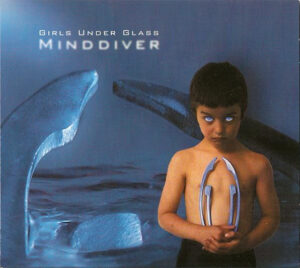 —At the time you had your own record label. How was the experience?
—At the time you had your own record label. How was the experience?
—VZ: We only released one record on our own label because we recognized it was too much to work to handle everything on our own. Now, 20 years later the situation is obviously different, and any band easily can release anything they want via different channels and distributors.
—What can you please tell us of the recording of Focus: 20 years, the documentary about the band.
—VZ: It was important for us to have a release that shows GUGs way and takes the audience on our journey including rare video footage and an interview.
—In 2017, co-founding member Hauke Harms left the band. Was it difficult to continue without him?
—VZ: Axel and I were very much involved in other musical projects and perfectly worked as a team so we knew we could do without Hauke but ending up with a different result when it comes to sounds etc. Hauke has his very unique style of how to create sounds. In the end I have to say that Axel and I are a perfect team to create, write and produce songs. Saying that as you might know, Axel and Hauke also have recent collaborations going on (Traum-B, Ermes/Harms) and we are all still good friends. Also, the song “Eiskalt” from our latest release was written by Hauke. So, in one way or the other he is still part of the GUG family.
—Volker, you have said that the lyrics were before a bit more social and now more personal. What are the main inspirations for your lyrics?
—VZ: There was a long period in life where I was mainly taking care about my “inner life”, practising lots of mediation, different forms of healing and so on. These days I am more taking care about the outside world which gives me lots of different impulses and themes to write about. I am filtering what’s happening in the world and try to describe what I feel and see.
—Zyklus according to the band closed a circle, but what did you mean with that?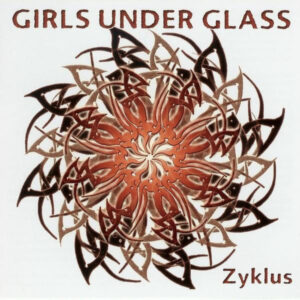
—VZ: Zyklus – for us – was THE perfect album, song-& production-wise, so we could not imagine how to continue after that. The name ZYKLUS was meant to define a closing cycle (beginning with Humus). That’s also the reason why we haven’t done anything for GUG for almost 16 years. When we got the feeling it’s the right to continue the GUG story It took us another 2 years to bring Backdraft on the road.
—The band has always been linked to the Goth Scene although you said that you were not a “scene band”. Have you ever felt any kind of compromise because most of your public was goth?
—VZ: Not really. It was never a problem as we were very much involved in the 80s Goth scene. We grew up with The Cure, Sisters, Play Dead, Danse Society, Joy Division, Fra Lippo Lippi, Cindy Talk, early Diamanda Galas and later on with The Cassandra Complex, Front 242 etc. We were huge fans of all these bands, so it was part of our life and identification. At the same time we never felt the pressure of following the idea of styling like goths. Being goth comes from the heart, not from dressing up like other people to show we are part of their fashion bubble.
—You said that the band tries to make atemporal music. Do you think that a band where the technology is quite important has to effort more to do that or were you speaking mainly about the songs?
—AXEL: I see the technology as a tool. So, the better the technology gets, the better and easier it is for us to finally generate what we want. But the main idea and the spirit keep the same. On the other hand, some old synthesizers like the Korg MS 20 are never outdated. What we try to avoid are temporary effects and trends (e.g. Autotune, etc.). We would like to be able to play the songs also on an acoustic guitar if needed. That’s not always possible but in many songs it is. The art of songwriting is sometimes underrated. Of course, there are many tracks where the atmosphere speaks for itself, but I always feel good when people recognize songs even when they are played with different instruments…
—The band has gone over multiple changes of style in these years, do you think that your fans managed to follow you? You said that you always wanted to renew the band with every new release. Was it easy?
—VZ: When we started to do new songs after releasing an album it was always like an adventure because we didn’t start the new ideas with a masterplan in our head. We were just in a creative flow with an open end. So, when an album was ready we sometimes were surprised how some ideas turned out and developed until they became a final song. It was just this “open-minded” feel of creation without being stuck to certain cliches and expectations. We just left ourselves the freedom to do what felt right at that time. Not many bands have or feel this freedom.
—How is playing with Thomas Lücke again? Is he going to be a full member of the band or je is going to join you just for concerts?
—VZ: It feels great! We absolutely love the part of the live set when Tom enters the stage and performs the early 80s stuff in his unique style. It has a different power and brings a big bonus to all shows. His performance is very intense and extroverted. And yes, he is a full member and will also perform on the upcoming album.
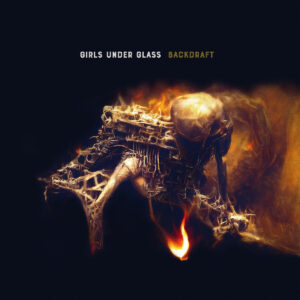 —In an interview the band said that the new album was influenced by some underground Neue Deutsche Welle band. I am currently discovering a lot of this music, so I am curious to know what bands have influenced you and which one you like.
—In an interview the band said that the new album was influenced by some underground Neue Deutsche Welle band. I am currently discovering a lot of this music, so I am curious to know what bands have influenced you and which one you like.
—VZ: We loved NDW when it was more like an underground thing and before it became super popular and a synonym for modern German Schlager. When we talk about influential NDW bands we talk about Fehlfarben, Palais Schaumburg, DAF (of course!!), Nichts, Ideal, Pyrolator, Grauzone (even if they come from Switzerland) and less known bands.
—Now you are back to a trio (fourth when Thomas Lücke plays with you) but how was the time when you were seven on stage?
—VZ: With 7 people on stage the problem always was that after each show the fridge was empty, so we didn’t have the chance to get drunk and feel like being rock stars 😉 OK… seriously… it was a great experience we don’t want to miss but it feels completely different to have a small core of people who shares exactly the same idea so you don’t have to discuss all details and roles over and over again. It’s a different (and easier) way to work. Also, having a real drummer in the band was limiting the result to something that always had a rock-approach. Bumm, Tschack, Break… and that’s not how we define GUG because we feel the limitation. If a song needs rock drums and bumm tschack we use it. When a song needs simple electro drums or 80s beats, we just add it. We are free to give any song anything it needs. GUG works and creates more like an electronic band and add guitars or whatever is needed WHEN its needed.
—What are your plans for the future? Any update on the 35th anniversary boxset?
—AXEL: The 35th anniversary box was a great idea, but the pandemic came and we felt a bit unsure what to do. We couldn’t play concerts and so we rather worked on new songs which ended in the Backdraft album. Then we decided to skip the 35th anniversary and work on an “update” (the 40th anniversary) instead.
—We always like to make some questions at the end of the interview about side projects, but in this case, I guess it’s mandatory as in Trauma, your “trance” band, we also had Hauke Harms and Axel Ermes. According to the band, it was an expression of your passion for cold electronic music of the 70s combined with very new, contemporary elements. I have always been curious about the link between 70s electronic music and trance. How do you see it?
—AXEL: Well, the 70s electronic scene in the tradition of the so-called “Berliner Schule” with Klaus Schulze, Roedelius, Moebius, Ashra, etc. were very “hypnotic” or “drugs” inspired. Repetitive rhythms and “trancey” sequencers built up in a certain way. Those structures and sounds have been transported into the trance and goa scene, too. Of course, the technology has improved, MIDI was invented and everything regarding the rhythmic synchronisation of different machines and synthesizers would become easier.
—You said that the third album of Trauma was a big influence in Equilibrium. How would you say that your side projects have influenced the main band?
—AXEL: I think it is always a matter of sending, receiving, reflecting and sending back again. That’s how life and interaction in general but also music works. When we start working on songs we almost never have the exact plan to write music for a certain project. It is more that after a while we understand the growing song as suitable for this or that band or project. When we worked on Trauma‘s Phase III it was a bit strange because we were exactly the same individuals that worked on the GUG albums. So in the end some songs would have the flexibility to either become a Trauma or a GUG song. Just in the final phase of production we then went more into detail and e.g. added more guitars for GUG or more atmospheric synthpads for Trauma.
—Volken, you have also been playing with The Cassandra Complex (since 1990) and you play with them at W-Fest, how would you describe these almost 35 years in the band?
—VZ: I was a huge Cassandra fan from their very beginning. So, when Rodney asked me to join this legendary band in 1991 (after he finished the production for the GUG album Positive) it was definitely a big step and great honor for me. I got to know many great musicians and human beings – all being part of the CX family for a certain period. We went through several ups and downs and had a great time together. Without CX I could have never experienced all of this. It’s an important part of my life.
—How is going to be your concert at W-Fest?
—VZ: We are very excited to play W-Fest for the first time and see this as a perfect opportunity to play also in front of people who haven’t seen GUG live yet. We will give 100% and prepare and play a kick ass set. Funny enough we share stage with Cassandra Complex who are playing directly after GUG.



